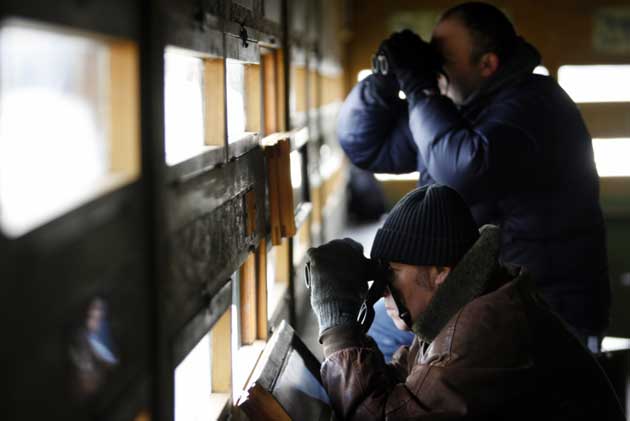Early birds: Twitchers look out for 'rarity' spot
In its Big Garden Birdwatch this weekend, the RSPB expects more species to be spotted – thanks to climate change. Paul Bignell and Richard Osley report

To many of the twitchers poised by the reed beds at the London Wetland Centre yesterday, this weekend's Big Garden Birdwatch was a matter of sublime indifference. While most people are being urged to spend an hour totting up anything with a beak in the back garden, the hardcore "professionals" out in force had only bitterns in mind.
The bittern, a wader so secretive it is described by twitchers as a "rarity" spot – there are said to be only about 100 in the country – had been seen earlier at the centre in Barnes, south- west London.
The hundreds of thousands of ordinary people expected to participate in Birdwatch this weekend are being urged to be a little less exclusive in their bird-spotting. The Royal Society for the Protection of Birds (RSPB) stressed that casual watchers "certainly don't need to be serious twitchers to take part. All you need to do is record all the birds you see in your back garden or a public place for one hour." The event, billed as the world's biggest wildlife survey, helps the charity get a clear picture of bird numbers in Britain.
The RSPB's experts believe the variety of species to be seen this year could be greater than ever as a result of climate change. Dr Mark Avery, the RSPB's conservation director, said: "Milder winter temperatures in the UK mean birds aren't bothering to fly south. In the past five years, birds such as blackcaps have been seen more often. It would have been virtually unheard of to see these in UK gardens 30 years ago when the Birdwatch first started."
Climate change has brought about a similar revolution in other aspects of British wildlife, according to the Woodland Trust, the environmental charity. The trust's Nature Calendar – a nationwide survey by thousands of volunteers who record things as varied as the first song of the song thrush, or sightings of the first butterfly or frogspawn – have warned that the latest evidence shows that climate change continues to transform springtime.
According to the trust's extensive records, some of which date back to the 1700s, plants such as the snowdrop are emerging 15 days earlier than the average for the past 30 years, while frogs lay spawn two weeks earlier.
The Woodland Trust said the changes are a cause for concern. Species fooled by mild winters into blossoming or breeding are vulnerable and can get caught out by a cold spell. Richard Smithers, its UK conservation adviser, said: "Species are doing their thing earlier and earlier; the danger is some may have got 'locked-in' to their seasonal advance. More likely, though, if we get a sudden warm spell, lots of things could start to happen, then it could switch to being cold and you'll end up with species having real problems.
"Frogspawning is one of the most responsive events... to climate. In recent years, we've had frogs spawning as early as October – which is quite ridiculous. It's almost as if spring is happening before autumn has ended." And frozen frogspawn, he added, could have "an impact on breeding success".
Another potential problem outlined by the trust was that species could get out of sync with one another. "A good example would be the orange-tip butterfly and garlic mustard – which is its [larva's] food plant," Mr Smithers said. "If the butterfly responds faster [to climate] than garlic mustard, the butterfly could emerge in the spring to lay its eggs and there would be no garlic mustard around. What does it do then?"
Subscribe to Independent Premium to bookmark this article
Want to bookmark your favourite articles and stories to read or reference later? Start your Independent Premium subscription today.

Join our commenting forum
Join thought-provoking conversations, follow other Independent readers and see their replies